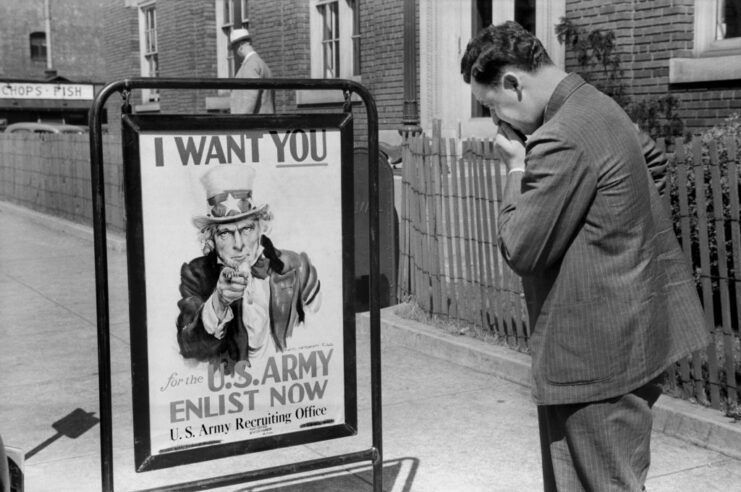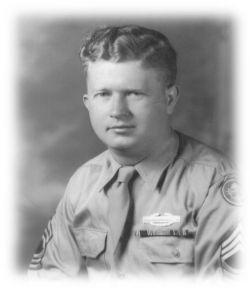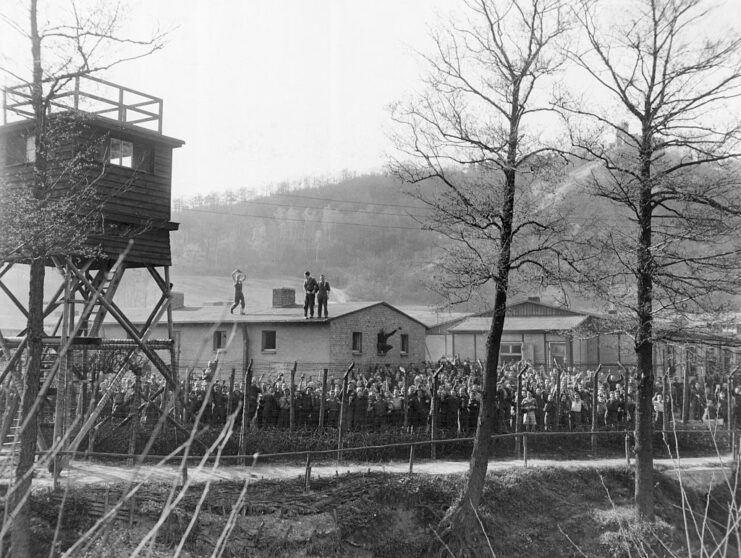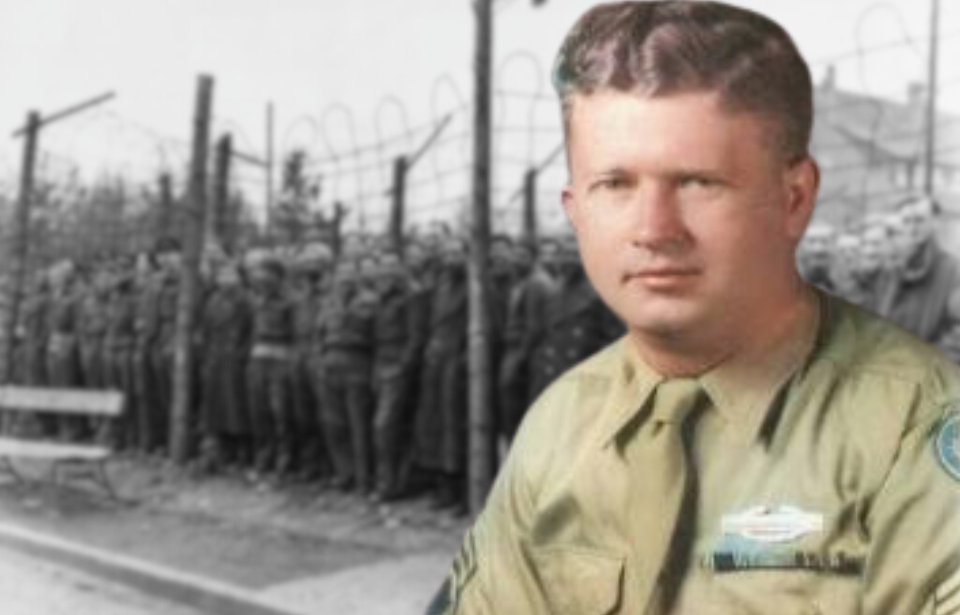During World War II, numerous Americans risked their lives to help others in peril. A notable hero among them was Master Sgt. Roddie Edmonds, who demonstrated extraordinary bravery. Even while imprisoned in a German prisoner of war (POW) camp, the noncommissioned officer defied a German commandant’s orders, ultimately saving the lives of hundreds of Jewish-American soldiers.
Roddie Edmonds’ early life and enlistment in the US Army

Roddie Edmonds was born on August 20, 1919, in South Knoxville, Tennessee. While not much is known about his childhood, it is noted that he grew up with three brothers, graduated from Knoxville High in 1938, and attended a local Methodist church.
Edmonds enlisted in the US Army nearly nine months before the Japanese attack on Pearl Harbor in December 1941. At 22 years old, he signed up at Fort Oglethorpe, Georgia.
Deployed to Europe

As the Second World War continued to batter the European and Pacific theaters, Roddie Edmonds was deployed to Europe with the 422nd Infantry Regiment, 106th Infantry Division. Despite being the highest-ranking noncommisisoned officer (NCO) in his regiment, he didn’t throw his rank in other soldiers’ faces.
“He did not throw his rank around,” fellow veteran Lester J. Tanner told Yad Vashem. “You knew he knew his stuff, and he got across to you without being arrogant or inconsiderate. I admired him for his command… We were in combat on the front lines for only a short period, but it was clear that Roddie Edmonds was a man of great courage who led his men with the same capacity we had come to know in the States.”
In December 1944, just five days before the Germans launched the Battle of the Bulge, Edmonds arrived in the European Theater. He fought valiantly alongside his comrades in the 106th, but soon found himself surrounded by enemy troops.
Becoming a prisoner of war (POW)

Without a viable escape route, most of Roddie Edmonds’s troops surrendered to the Germans. Edmonds, however, held out for several days before finally conceding to the enemy on December 21, 1944.
After his capture, Edmonds and the others were moved to Stalag IX-B, a German prisoner of war camp located near Bad Orb in Hesse. The journey was grueling, consisting of a 50 km forced march to Gerolstein, Germany, followed by a seven-day train ride in cramped boxcars with little food and water.
Upon reaching Stalag IX-B, the prisoners were split into three categories: enlisted men, officers, and noncommissioned officers. Edmonds, as an NCO, was later transferred to another camp, Stalag IX-A, near Ziegenhain, Germany.
Roddie Edmonds stood up for his Jewish comrades

Roddie Edmonds became the senior-ranking noncommissioned officer at Stalag IX-A, taking responsibility for the camp’s 1,275 American prisoners of war.
On January 27, 1945, the camp commandant ordered Edmonds to have only Jewish-Americans report for roll call the following day, intending to segregate them from the rest. Recognizing the danger this posed to his Jewish comrades, Edmonds defied the order and instructed all the POWs to assemble outside their barracks.
Furious, the commandant brandished a pistol and demanded Edmonds reveal the Jewish soldiers, threatening him with death. Remaining calm, the NCO responded, “We are all Jews,” and warned the German officer that he’d be held accountable for war crimes under the Geneva Convention if any harm came to the men, emphasizing they were only required to provide their name, serial number and rank, not their religion.
Realizing he’d been outmaneuvered, the commandant lowered his weapon. Edmonds’ brave defiance is believed to have saved the lives of between 200 and 300 Jewish soldiers.
Surviving the war

After enduring 100 days of captivity by the Germans, Roddie Edmonds returned to the United States and chose never to speak about his time at Stalag IX-B, keeping his experiences hidden even from his family.
He later responded to the call of duty again during the Korean War with the US Army. Following his military service, he pursued careers in mobile home and cable sales, and also worked at The Knoxville Journal, a local newspaper. Throughout his life, Edmonds married three times and passed away on August 8, 1985. He was laid to rest at Berry Highland Memorial Cemetery in Knoxville, never sharing his wartime bravery with anyone.
Edmonds’ heroic deeds might have remained unknown if not for his son, Rev. Chris Edmonds, who was determined to ensure his father received the recognition he deserved.
Roddie Edmonds was honored by Yad Vashem

After being given his father’s wartime diaries, Roddie Edmonds’ son came across entries about his time at Stalag IX-A. Wanting to learn more, Chris did some digging and located several of the veterans who’d served alongside the elder Edmonds. This ultimately led to the involvement of Yad Vashem, to whom the retired servicemen were willing to share aspects of the master sergeant’s bravery.
Edmonds was recognized as being “Righteous Among the Nations,” Israel’s highest honor for non-Jewish individuals who went out of their way to save people during the Holocaust, in February 2015. Just under a year later, on January 27, 2016, a ceremony was held at the Israeli Embassy in Washington, DC. Then-US President Barack Obama was present.
Of the 25,000 individuals who’ve been named Righteous Among the Nations, Edmonds is only the fifth American. As well, he is the only one to have been an active US service member during the Second World War.
Push to award Roddie Edmonds the Congressional Gold Medal

While happy his father was honored by Yad Vashem, Chris is pushing for more recognition from the United States. He’d initially sought for Roddie Edmonds to be awarded the Medal of Honor, but this was denied, as his actions didn’t occur in combat.
More from us: Witold Pilecki Risked His Life for the Polish Resistance By Voluntarily Being Imprisoned At Auschwitz
New! Want to become a trivia master? Sign up for our War History Fact of the Day newsletter!
There has since been a push to posthumously award Edmonds with the Congressional Gold Medal, the highest civilian award handed out by the US Congress. This has had the backing of many, with the Master Sergeant Roddie Edmonds Congressional Gold Medal Act being introduced in the House on April 24, 2023.
There has been no notable action since this date.
